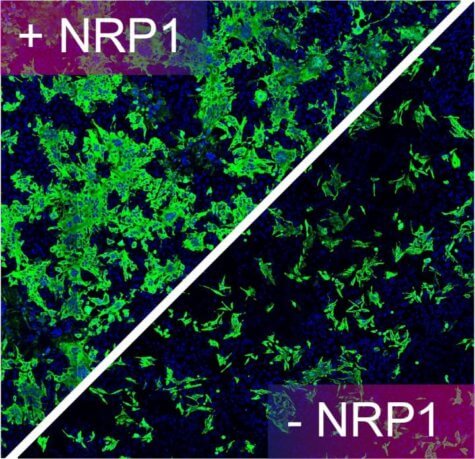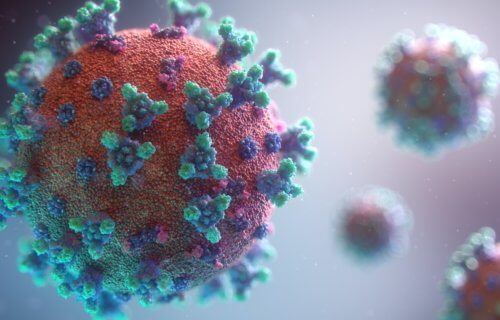BRISTOL, United Kingdom — Despite millions of cases and months of research, scientists have had tremendous difficulty pinning down what makes COVID-19 so infectious. Now, a team in the United Kingdom says they’ve made a breakthrough in understanding the virus. Their study has uncovered the interaction between human cells and virus particles which makes the pandemic spread.
Researchers from the University of Bristol reveal SARS-CoV-2, the virus causing COVID-19, recognizes and seeks out a protein called neuropilin-1. This protein is on the surface of human cells and facilitates the infection process.
Scientists have known that SARS-CoV-2 first attacks cells in the lungs or intestinal tract. The virus then uses its “spike” protein to latch on, hijack cells, and force them to replicate more virus particles. Knowing how COVID-19 attacks cells and spreads throughout the body may give researchers the clue they need to block these interactions between COVID-19 and neuropilin-1.
“In looking at the sequence of the SARS-CoV-2 Spike protein we were struck by the presence of a small sequence of amino acids that appeared to mimic a protein sequence found in human proteins which interact with neuropilin-1,” study authors say in a media release.
“This led us to propose a simple hypothesis: could the Spike protein of SARS-CoV-2 associate with neuropilin-1 to aid viral infection of human cells? Excitingly, in applying a range of structural and biochemical approaches we have been able to establish that the Spike protein of SARS-CoV-2 does indeed bind to neuropilin-1.”
Blocking the spread of coronavirus

Using the breakthrough findings, the team adds monoclonal antibodies may help reduce the SARS-CoV-2’s ability to hijack human cells. These antibodies are lab-synthesized proteins which resemble natural antibodies in the body. A number of specific drugs may also help break up COVID-19’s cellular takeover.
The study notes that teams at the Technical University of Munich in Germany and the University of Helsinki in Finland have also discovered this link to neuropilin-1.
“This serves to highlight the potential therapeutic value of our discovery in the fight against COVID-19,” adds Dr. Yohei Yamauchi, Dr. Boris Simonetti, and Professor Peter Cullen.
“To defeat COVID-19 we will be relying on an effective vaccine and an arsenal of anti-viral therapeutics. Our discovery of the binding of the SARS-CoV-2 Spike to neuropilin-1 and its importance for viral infectivity provides a previously unrecognized avenue for anti-viral therapies to curb the current COVID-19 pandemic.”
The study appears in the journal Science.
